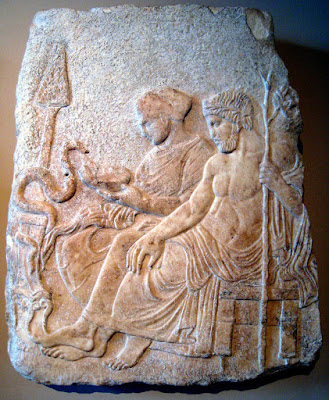If you look for Myrrha in Dante's Commedia, you might be surprised where she can be found. In the 10th bolgia, or sac, of the eighth circle, (in Canto 30) she enters as one of a pair of violent spirits racing around the pit, tearing other shades to pieces with their teeth. She and Gianni Schicchi are compared to beasts:
The canto is rich in imagery and suggestive power, perhaps in part because it's the canto of falsifiers, liars. For Dante, who defined poetry as una bella menzogna -- a beautiful lie -- the proximity of the poetic enterprise to the vicious worlds of impersonators, counterfeiters, and famous liars (including Sinon, the Greek who talked the Trojans into opening their city to the wooden horse, and Potiphar's wife, false accuser of Joseph in Genesis) -- seems to provoke a stunning burst of vivid narrative fragments.
Most of these are from Ovid. I'll just note them here -- a reading of the entire canto is a task for another day. The books of Metamorphoses where each appears are in parens:
Clearly Dante not only read Ovid with care, but with acute attention to the interplay of illusion and the likenesses of truth that we have come to appreciate as "Ovidian."
... two shades I saw, both pale and naked,
who, biting, ran berserk in just the way
a hog does when it's let loose from its sty.
The canto is rich in imagery and suggestive power, perhaps in part because it's the canto of falsifiers, liars. For Dante, who defined poetry as una bella menzogna -- a beautiful lie -- the proximity of the poetic enterprise to the vicious worlds of impersonators, counterfeiters, and famous liars (including Sinon, the Greek who talked the Trojans into opening their city to the wooden horse, and Potiphar's wife, false accuser of Joseph in Genesis) -- seems to provoke a stunning burst of vivid narrative fragments.
Most of these are from Ovid. I'll just note them here -- a reading of the entire canto is a task for another day. The books of Metamorphoses where each appears are in parens:
- The canto begins with Juno's rage against Semele (Book 3);
- Which leads to the madness of Athamas, who hurls his own son Learchus to his death (Books 3-4).
- And to Hecuba, turned into a barking lunatic at the sight of her children, Polyxena and Polydorus, dead in ruined Troy (7 & 13).
- Then "accursed Myrrah": "she who loved her father past the limits of just love" (Book 10).
- The vile exchange of japes between Maestro Adamo the Florentine counterfeiter and Sinon the lying Greek (Sinon is not in Ovid, but from the Aeneid) leads to a final Ovidian reference when Adamo says to Sinon:
"You have both dryness and a head that aches;
few words would be sufficient invitation
to have you lick the mirror of Narcissus." (Book 3)
With a simile that could have come from the poet of Metamorphoses himself, Dante conveys the burden of being caught in the entrancingly duplicitous world of appearances:
Even as one who dreams that he is harmed
and, dreaming, wishes he were dreaming, thus
desiring that which is, as if it were not,
so I became within my speechlessness.
 |
| Dore: Myrrha, Virgil, Dante |




